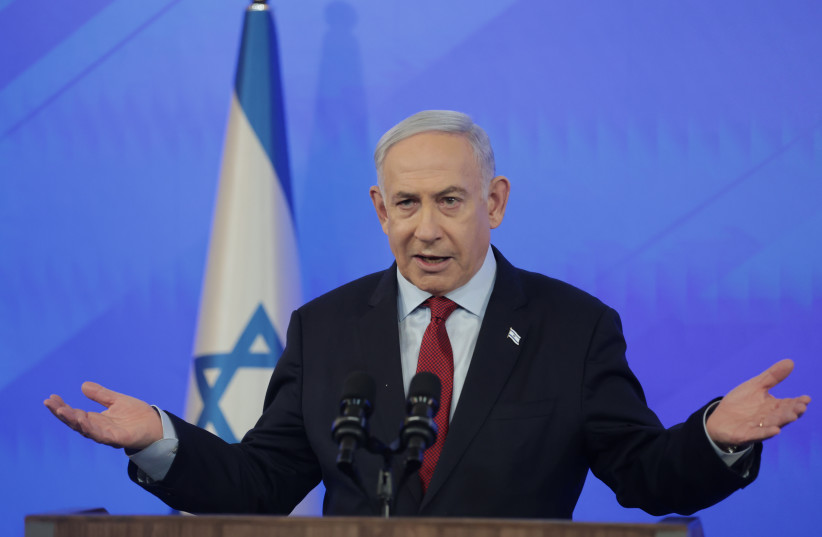The Likud’s response to the Meron report is indicative of the party’s tactics and strategy surrounding the question of responsibility, accountability, and blame for the October 7 Hamas massacre: Prime Minister Benjamin Netanyahu is not to blame, and anyone who claims so has partisan political motives.
The response came from the party, not from the prime minister himself. Netanyahu’s media team knows how to put him in the limelight when they want to: they use video statements, pictures, written statements, and often a mix of all of the above. In this case, a written statement from the Likud party, not the prime minister himself, shows that the prime minister intends to keep himself as far away as possible from the report’s conclusions.
The content of the response follows this theme. It begins, “The Meron disaster was tragic, our hearts are with the families of the victims. In practice, the government has already implemented the required conclusions, and the last event at Meron was held with a large crowd and without fault. The government will examine the need to implement additional operational lessons to prevent a repetition of a disaster such as this.”
The statement then moves on to accusations: “However, it is unfortunate that for the first time in history, the government led by Bennett and Lapid formed a committee of investigation against its predecessor in the political Right, and in which a central member was a confidante of Lapid, Shlomo Yanai, who received an offer for a spot in the Yesh Atid Knesset list. This is a completely distinct political provocation. Lapid’s cynical and intentional attempt to turn the Meron disaster into a political tool will not succeed.”

This response was criticized by members of nearly all of the political parties, including the Likud itself, as well as by a forum that represents the families of the victims, who called it “disgraceful.”
It is worth noting that members of the National Commission of Inquiry were chosen by then-chief justice Esther Hayut, not by the Lapid-Bennett government. The Netanyahu government at the time of the disaster dragged its feet in forming the committee, and at first attempted to form a governmental or parliamentary committee, which would give it some power over the identity of the committee members, as well as reduce the impact of its conclusions.
Furthermore, the Likud’s response did not mention that Yanai is a retired IDF Major General, a recipient of the IDF’s Medal of Distinguished Service, a former CEO of Teva Pharmaceutical Industries, and, according to Haaretz reporter Yossi Melman, was Netanyahu’s choice to head the Mossad in 2010 (which Yanai turned down). Nor did the response mention the other distinguished members of the commission – former Supreme Court President Miriam Naor, who was replaced by Tel Aviv District Court president Devorah Berliner, and Rabbi Mordechai Karelitz, former mayor of Bnei Brak.
Instead of at least acknowledging the fact that Netanyahu was found to bear personal responsibility for the disaster, the response attempts to discredit the members of the committee. Other than saying that the government will examine whether there are any more lessons to implement, the response does not address any of the sweeping systemic failures that the committee found led to the disaster – nor the fact that these failures were exacerbated during the decade before the disaster, during which Netanyahu was prime minister.
Likud responds similarly to October 7
The response is indicative of how the Likud has responded to the October 7 massacre. At least on two occasions, the Likud put out immediate responses to reported intelligence failures leading up to the massacre, in which it said that Netanyahu was not aware of the intelligence and that he was not forewarned by IDF officials.
The prime minister has promised that there will be a committee of investigation, but it is not clear when such a committee will be formed. In addition, since the October 7 massacre, he mentioned the word “responsibility” in just one press conference – and said that he was “responsible for the future of the State of Israel,” which implied that he was not responsible for events in the past.
The government was slammed with responsibility for the failures of October 7, and at first, the word “responsibility” was uttered by no one; slowly, that changed. IDF Chief of Staff Lt.-Gen. Herzi Halevi said it first, followed by Defense Minister Yoav Gallant and Finance Minister Bezalel Smotrich. Netanyahu still has not.
A direct line links the Likud’s response to the Meron report and its statements since the October 7 massacre: Netanyahu is not responsible, and whoever claims so has political motives. This is likely to continue, and it is thus not clear how and when those who bear responsibility for the events of October 7 will be held accountable.
